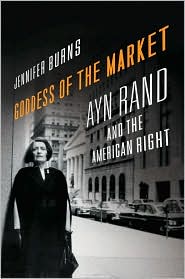
Every serious reader I have ever met has read at least one of Ayn Rand’s best selling novels “Fountainhead” and “Atlas Shrugged” and most of the people I met have had strong opinions about her and her philosophy. I was 20 when I read “Fountainhead” and the words of Ayn Rand molded my thoughts and my philosophy; Rand became the person who gave me a direction to the way I would lead my life. Once discovered, reading her never satiated my thirst, I kept wanting more and went on to read almost all her published works. There still are times when I open “Virtue of Selfishness” and find a way to sort my confused thoughts.
So when Tarique ordered “Goddess of the market” by Jennifer Burns, I was more than keen to read it. Not only it would give me more insights about my favourite books, but also give me a peek in the life of one of the most influential writers in the world : Ayn Rand. I must say here that I did disagree with her on some notions, but it was the premise of Rand’s philosophy that made her emerge a hero.
The best thing about the book, Goddess of the market” is that it is an intellectual biography that does not sensationalize Ayn Rand’s life and her affair. (quite unlike “The passion of Ayn Rand” written by Barbara Branden.) Burns has objectively put forth the events that happened during Rand’s time in history and how Ayn Rand dealt with them. Jennifer Burns years of research on the celebrated author is evident from the material she presents to the reader.
Rand’s influence and interest in American politics, as well as her rigid stance about how a country should be run is well presented. A lot of Rand’s readers are not aware of her interest and active participation in various political organizations right since her Hollywood years (prior to the publication of Fountainhead). As a captivating sought after speaker, she engaged many capitalist minds and and influenced them in the formative years and despite being their harsh critic, the libertarians credited Rand as an important intellectual influence on their party. Rand did face several setbacks, both professionally as an author as well as as a political thinker, and Burns very effectively portrays how it affected Rand’s fictional work (Atlas Shrugged specifically).
The book capture highs and lows of Rand’s life with complete honesty and it tells the reader that the author of Fountainhead was not above faltering in her own philosophy and more importantly, it tells me that Ayn Rand was not Howard Roark, Dominique Francon or Francisco d’Anconia. They are my heroes and they were her’s too. Ayn Rand, as a person, had several shortcomings. Shortcomings that her fans are easy to miss when they see her in light of her heroes. There were flaws in her application of her own philosophy to her own persona. Those flaws to some extent influenced her relationships.
It took me a long time to finish the book, I had to ingest the written word, dwell upon it and accept it, specially the parts where I discovered I did not agree with Rand’s point of view, actions or her blanket opinions (like her stand on environmentalists).
However, now, that I have finished reading this very engrossing and informative biography, I find myself enriched and perhaps a little more capable of looking at my heroes and their author’s life distinctively.
Swati,
Can you give us a few simple examples of how Rand or Objectivism helped guide your life?
I grew up in an orthodox joint family, constantly being “told” to do things that a girl should – (seek approvals, follow religion in the “prescribed” way, sacrifice my happiness for some one else’s, never try to reason with elders and so on). I was already a rebel when I read Rand but a rebel without any understanding of the wrongs. My belief in the ethics I was following to lead my life got reinforced when I finally laid my hand on Fountainhead and her other books 🙂
Thanks, Swati. I’m not a fan of Rand or her philosophy, but I hadn’t considered it in context of the position of women (or anyone, really) in Indian society. Something to think about.
Being a voracious reader of Rand’s books myself I see this as a must read on my list now.
It is qutie good. The one real criticism I would have of Burns is that while she reported on the essentials of Rand’s philosophy fairly accurately, the way she did it led me to think that she never really “got” the philosophy the way I would have expected someone who had studied Rand so deeply to do. For example, she constantly cites Rand’s need for “consistency” as a result of her upbringing in Soviet Russia, and treats it like something Rand pursued out of a personal preference, rather than as an essential part of any valid theory (philosophical or otherwise).
I admit I kind of dreaded reading the book at first. Rand is a volatile subject and I wasn’t sure how Burns would treat her or her failings. However, the book turned out to very evenhanded and fair when dealing with the details of Rand’s life even if Burns didn’t always seem to get the details of Rand’s philosophy.
Thank you, Brianna for your comment.
As you are a fan of Ayn Rand, We are pleased to announce a special screening of the film “We The Living”, and Live
interaction with the producer Duncan Scott at 3 p.m. on Saturday, 21 August 2010, at the NCUI Auditorium in Delhi.
The detailed program for the evening is as follows:
Venue: Committee Room Alpha, National Cooperative Union of India (NCUI),
3 Siri Fort Institutional Area, August Kranti Marg, New Delhi 110016
Date and Time: 21 August 2010, 3 pm
RSVP:
Liberty Institute, New Delhi
Tel: +91-11-28031309, Email: info@AynRand.in
http://aynrandindia.blogspot.com/2010/08/special-event-screening-of-ayn-rands-we.html